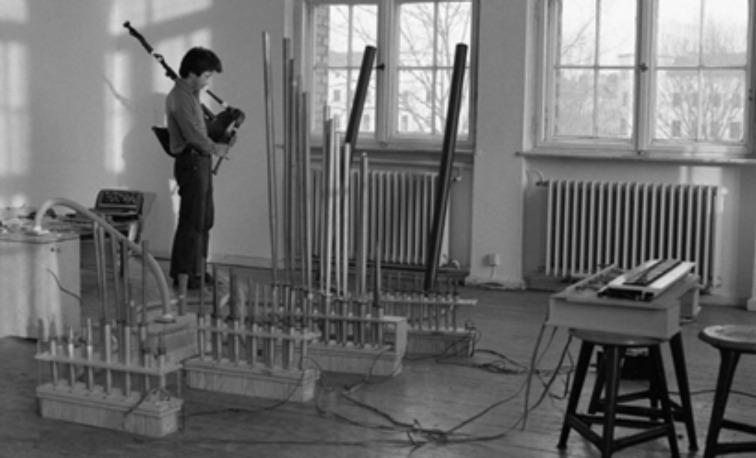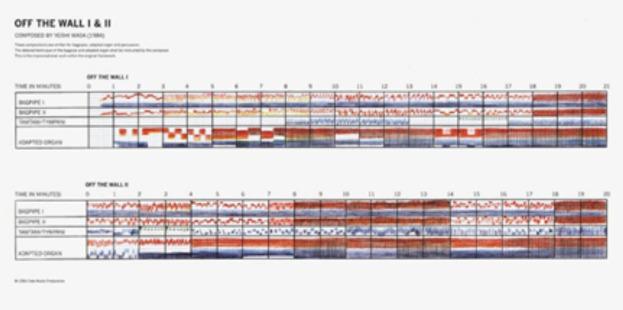The Bagpipe Society
Yoshi Wada (1943 - 2021), a Reflection

About 10 years ago my son gave me a CD re-release of an LP from 1981 called “Lament For The Rise And Fall Of The Elephantine Crocodile” by Yoshi Wada. I played it a couple of times, without giving too much attention to it, and then filed it away and would not have listened to it again had not Liam recently emailed me to let me know that Yoshi Wada had died earlier this year. This prompted me to revisit the CD. I read the sleeve notes more carefully and began to get a better understanding of the piece, which in its turn, led me to some online research. I have become intrigued that Yoshi Wada has been largely ignored by the conventional bagpipe world. He was a musical pioneer with an international reputation who used bagpipes as a key element in much of his music and I believe that he deserves more recognition.
Yoshi Wada was born in 1943 in Kyoto, Japan and graduated from Kyoto University in 1967 with a degree in sculpture. He moved to New York the same year and became closely involved with the Fluxus artistic movement- an influential part of the New York experimental arts scene at the time. Through Fluxus he met many avant-garde artists, who since have gained international recognition.
His shift from sculpture into the world of music and sound began after he met the minimalist composer La Monte Young and also began learning singing and meditation with sound, improvisation, and intonation with Pandit Pran Nath. In the late 1970s he attended a Highland Games in Connecticut which led to his passion for playing the highland pipes and a fascination with tuning systems and drone music in general. He also met the composer and instrument maker Harry Partch who inspired him to build his own musical instruments.
He wrote
after all these experiences, I realised that the most important element in music for me is not melody and rhythm, but sound itself - pitch relationship, harmonic progression and resonance.
In the sleeve notes for his LP “Lament For The Rise And Fall Of The Elephantine Crocodile” he describes it as one continuous piece. On Side A he is singing solo and Side B is instrumental music of the bagpipe with singing. He writes
The piece itself is an experiment with reed and improvisational singing within the modal structure. I originally built the bagpipe instrument out of plumbing fittings* *and pipes pumped by a large compressor. I called it “an adapted bagpipe with sympathy”
Since that time the original instrument has been altered and improved for the stability of the air source and accuracy of the tuning. For this recording I created two new bagpipe-like instruments The Elephantine Crocodile and The Alligator, which both have their air supplied by a large compressor. The Alligator instrument plays precise pitch and enables me to tune the Elephantine Crocodile drone pipe pitch. When I began to work with these cane reed pipes, I realised that they could be tuned to produce the intervals of extremely fine tolerance. One of the strong characteristics of these bagpipe drones is the clarity of harmonics and partials in the higher octaves. When these pipes are perfectly in tune, in unison, or in different intervals, one can hear the high microtonal partials very clearly’.

My research led me to discover that all six of his recordings are available on Youtube, along with other performances and interviews with him and his son Tashi.
One video is a recording of his extraordinary and frenetic piece Off The Wall, which was performed and recorded in 1985 in Berlin. The cover photo shows a bewildering array of pipes - a mixture of organ pipes of varying sizes, bagpipe drones and highland chanters linked with a spaghetti- like tangle of tubes, which provides the musical backdrop for a percussionist and Yoshi and another Highland piper to weave an extraordinary and frantic flurry of intricate and mesmeric sounds.
There are other videos on Youtube, including a 26-minute video of a live performance of The Lament Of John Cage, which features Yoshi playing the Highland Pipes together with members of the city of Newcastle Pipe Band, two electric guitars, timpani and his son Tashi Wada playing the reed organ.
Yoshi Wada had a long and distinguished international career as a composer and performance artist and bagpipes were often a key component in his music. I suspect that the reason most pipers will be unaware of his work is because he mostly performed in galleries and other ‘art’ venues. But he was an important figure who was exploring new territories for the bagpipes, and I think that it would be a shame if the life of this musical pioneer was not recognised or acknowledged by the wider bagpipe world.
If you have an ear for experimental music then I suggest that you start by dedicating 20 minutes to listening to Side A of his composition Off The Wall. I find it an extraordinary experience.
Hopefully this will lead you to discover and appreciate more of his work.
Thank you, Yoshi Wada.
- Data Processing Notice (GDPR)
-
@BagpipeSociety on X (formally known as Twitter)
-
TheBagpipeSociety on Instagram
-
 BagpipeSociety on Facebook
BagpipeSociety on Facebook
Something wrong or missing from this page? Let us know!
